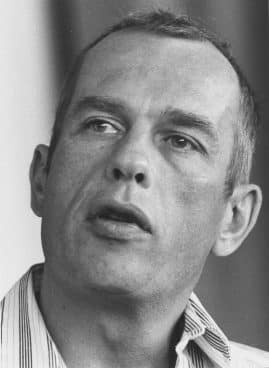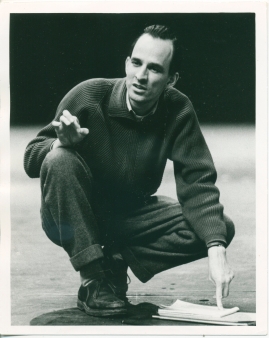Jörn Donner
Table of contents
- Basic facts
- Links and resources
- Biography
- Awards
- Films
- Original work
- Soundtrack listing
- Groups
Basic facts
Media (1)
| Producer |
|
|---|---|
| Director |
|
| Show all films | |
| Awards |
|
Biography
Finnish journalist, author, film producer, director and politician. CEO for the Swedish Film Institute 1978-1982. Born in Helsinki. Father of the director Johan Donner.-Jörn Donner comes from an illustrious family in Finland. His father was a philologist, explorer and politician, and Jörn grew up and studied in Helsinki, where he gained a master's degree in 1959. By then he had already published six books, and since then he has published around forty more, at an approximate rate of one per year. Some commentators are of the opinion that his literary work is his...
Links and resources
Biography
Finnish journalist, author, film producer, director and politician. CEO for the Swedish Film Institute 1978-1982. Born in Helsinki. Father of the director Johan Donner.
-
Jörn Donner comes from an illustrious family in Finland. His father was a philologist, explorer and politician, and Jörn grew up and studied in Helsinki, where he gained a master's degree in 1959. By then he had already published six books, and since then he has published around forty more, at an approximate rate of one per year. Some commentators are of the opinion that his literary work is his most significant. As a politician he has been a member of three different parties, but he served as an MP for the Swedish People's Party of Finland (Svenska Folkpartiet) from 1987-1995 and again in 2007. From 1995-1996 he was the Finnish Consul in Los Angeles and from 1996-1999 he was an MEP for the Social Democratic Party of Finland.
He began working as a film critic and columnist for the Swedish broadsheet Dagens Nyheter in 1961, and the following year he published a highly acclaimed study of the films of Ingmar Bergman, "Djävulens ansikte" ('Face of the Devil'). Inspired by the 1963 Swedish Film Agreement, he decided to try his luck as a film director. A Sunday in September (En söndag i september, 1963) was not exactly a success despite picking up a newcomer's award in Venice, but To Love (Att älska, 1964) was more positively received apart from certain criticisms of its literary dialogue and lack of tempo. Harriet Andersson, Donner's partner during the 1960s, played the lead in both films, winning a Best Actress award in Venice. The critics' ambivalence towards Donner's films remained with the Här börjar äventyret ('Adventure Starts Here', 1965) and Rooftree (Tvärbalk, 1967). It was felt that Donner had matured as a filmmaker, but that his films were dull in terms of form and content.
The five films which followed - some, such as Sixtynine (Sixtynine 69, 1969), with elements of soft pornography - were produced in Finland and mostly received negative criticism in Sweden, as far as they were screened at all. More successful was his comeback in Sweden in 1978 with a film version of Märta Tikkanens provocative novel "Män kan inte våldtas" ('Men Cannot Be Raped').
By that time Donner was well established in management at the Swedish Film Institute. In 1972 he had been appointed as one of the three directors whose brief was to manage the Institute under Harry Schein's leadership. Donner's main area of influence was the documentation department where he made a lasting contribution as the instigator and editor of "Svensk Filmografi", a series of nine books detail all feature films made from 1897-1999, the first of which appeared in 1977. The following year he took over from Harry Schein as CEO, and in 1982 he was the producer for Jan Troell's The Flight of the Eagle (Ingenjör Andrées luftfärd) and Ingmar Bergman's Fanny and Alexander (Fanny och Alexander), both of which received Oscar nominations.
The latter picked up four Academy Awards, including one for Foreign Language Film. A feather in the cap for Donner, certainly, but since both films had overshot their budgets by so much that the Film Institute's finances were under threat, he had to leave his CEO post before either had premiered.
Donner subsequently moved back to Finland for good, where he continued his career, first and foremost as an author and politician. As a man of many talents with an enviable capacity for work, an all-round journalist and lively debater, Donner is without equal. His contribution as a film director is something of a detached parenthesis in his career.
Bengt Forslund (2012)
(translated by Derek Jones)
Awards
| Chaplin Magazine Award | Stockholm | 1965 | |||
|---|---|---|---|---|---|
| Opera Prima | Venice | 1963 | (bästa regidebut, t.m. Le joli mai) |
Films
Original work
| Author |
|
|---|



